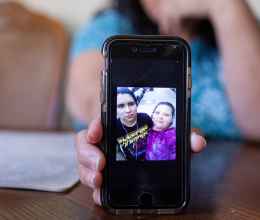
On July 26, ACLU/SC Executive Director Hector Villagra joined "Which Way, LA?" to discuss the destructive effects of the Secure Housing Units on public safety.
"Imagine how bad conditions have to be there that people would risk starving themselves to death. I could cite to you any number of studies showing the negative effects of prolonged isolation but I think there's just one simple fact that will show you how desperate these inmates are. In 2005, here in California, inmates in solitary confinement were only 5% of the total prison population, but they were 70% of the suicides among the prison population. That is people who are incredibly desperate, and for whom life has become intolerable."
Via KCRW's "Which Way, LA?"
Full Transcript:
Warren Olney, KCRW: "Also with us is Hector Villagra, who is Executive Director of the ACLU of Southern California. Thank you for being on our program."
Hector Villagra: "Thank you, Warren."
KCRW: "How concerned are you about the conditions I just discussed with Scott Kernan?"
Hector Villagra: "We are very concerned. Imagine how bad conditions have to be there, that people would risk starving themselves to death. I could cite to you any number of studies showing the negative effects of prolonged isolation but I think there's just one simple fact that will show you how desperate these inmates are: In 2005, here in California, inmates in solitary confinement were only 5% of the total prison population, but they were 70% of the suicides in the state that year among the prison population. That is people who are incredibly desperate, and for whom life has become intolerable. And it’s because of their prolonged confinement and they're being cut off from all human interaction."
KCRW: "What about what Scott Kernan said about the misery that they have caused to other people, as what he describes as 'the most dangerous criminals in California?'"
Hector Villagra: "There's no question that we have forms of punishment that we mete out against people who deserve them, on the basis of their criminal actions. But there are lines that we have drawn as a society and our constitution forbids cruel and unusual punishment. So it’s not enough to say 'they are the worst of the worst' and act as if there were no bounds of decency with respect to how we treat them."
KCRW: "Do you agree with Nancy Kincaid that the health situation in the prisons has improved?"
Hector Villagra: "You know, I don’t know enough about that to say. I do know that the crush of overcrowding makes it difficult for inmates to receive medical care on a timely basis in many instances. I’d be surprised if substantial change has occurred in the time that the receiver has been in effect, but I have no doubt that some change has occurred."
KCRW: "And Miss Kincaid, back to you. You said that the health conditions have improved -- does that mean that prisons are less crowded or is that a health issue?"
Nancy Kincaid, California Prison Health Services: "No, the overcrowding does continue to be an issue. The receiver would tell you that the one thing that it is keeping us from achieving the absolute that the court is requiring is overcrowding. But on our website, and the OIG website, there are public reports that show the substantial improvement that has been made in every one of the prisons.
Do we still have work to be done? Yes. Once the construction that has been authorized by the legislature is funded and we're able to move forward on what will give us the capacity, we will be able to finish the last of the work that needs to be done regarding medical care."
KCRW: "Hector Villagra, with the ACLU, do you think that will also ease the situation at Pelican Bay, or is it going to be policy for the state of California to have this single cell treatment that you say is so damaging to people?"
Hector Villagra: "More needs to be done to address this issue. We have to revisit whether it is in the interest of the public to be treating inmates this way. Because even though these may be 'the worst of the worst', we have to recognized that the great majority of these men will be released into the community at some point in time.
And what we know is that breaking them off from all social interaction, and sort of breaking their minds down, leaves them incapable of reintegrating back into society and makes them more likely to recidivate. So we have to be very careful that it might be nice to mete out vengeance against these worst of the worst, but we may be paying the price in the long run with higher crime rates."
KCRW: "They're not all serving life terms."
Hector Villagra: "That's right. That's right. I think I've seen studies that suggest that 95% of the inmates at the SHU in Pelican Bay will be released at some point in time and some, in fact, are actually released directly from solitary confinement into the community. They're completely unprepared to reintegrate into society."
KCRW: "Ok, I'm sorry Scott Kernan didn't want to talk with us. We'd like to be able to raise that issue with the Department of Corrections and Rehabilitation. We'd like to make an effort to do that on a future program. In the meantime, thanks to you all for being with us. Once again, Hector Villagra, Executive Director of the ACLU Southern California. Nancy Kincaid, Director of Communications for the California Prison Health Services. And our earlier guest Scott Kernan with the Department of Corrections and Rehabilitation. We'll be right back with Which Way, LA?"






